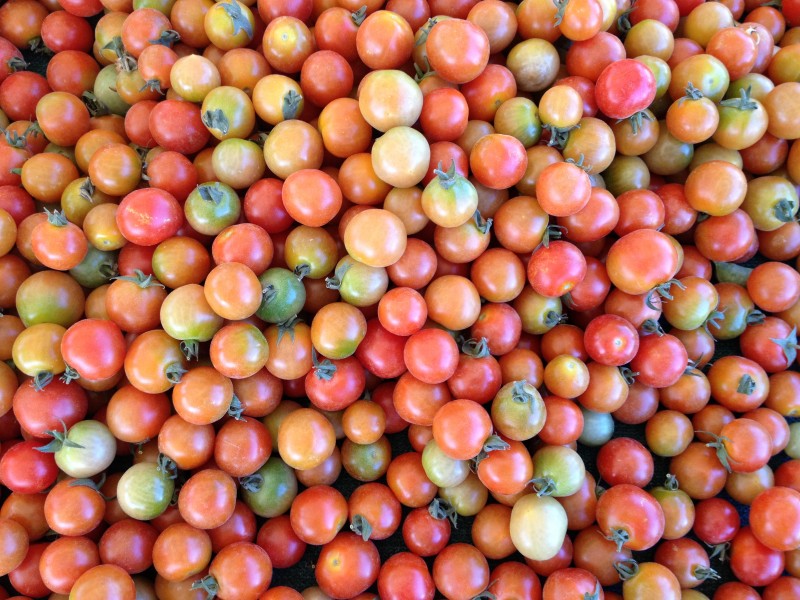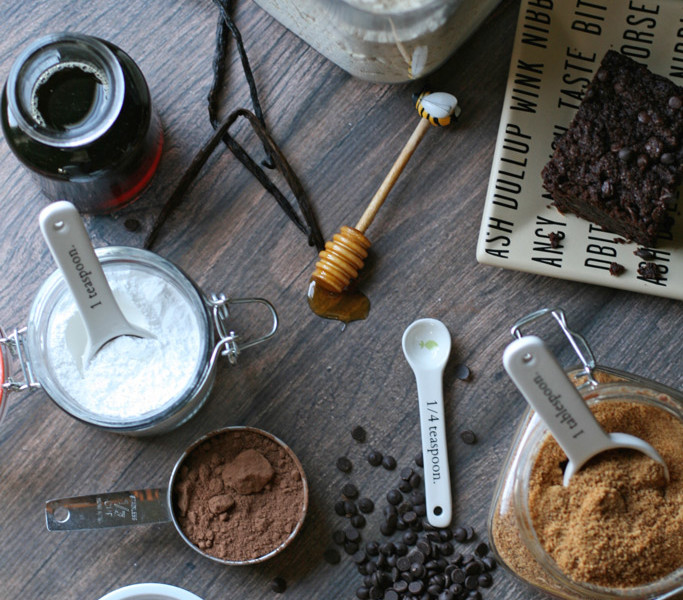Psstt.. every Wednesday I write a post called “Why I” and last week I wrote one on Why I Don’t Use a Night Light in my Kids Room — just in case you missed it.
In my orthorexic days, when I first learned of the crazy crap in our food, I obsessed about every little thing. I couldn’t go out to eat and enjoy a meal with thinking about what kind of stuff was in my food. I didn’t cheat, I made everything from scratch for Andrew if we went out to eat, and I would often decline wanting to go places.
Folks, this is NOT healthy.
Worrying about every little thing you put in your mouth does more damage than having a cheat day here or there because you want to, in my opinion. I feel much happier now that I have learned which foods I believe are important for me and my family to stay away from. I don’t think we eat nearly as “healthy” as we used to, but I’m much more relaxed and not obsessive over every little thing which makes me feel better.
One of the foods that I have continued to stay away from — even post-orthorexia days — is vegetable oil. Canola oil, corn oil, cottonseed oil, soy oil — all of those oils fall into the vegetable oil category, too. I could probably go on and on (you can watch this short video I made about eliminating industrialized oils), but here are the top 3 reasons why I don’t use vegetable oil for cooking anymore.
1. Most vegetable oil is heavily processed
Not many people know, but the process of making vegetable oil is an awful one. And when I say vegetable oil, I mean all the oils I mentioned above too (vegetable, corn, soy, canola, cottonseed). Most industrialized oils are actually fragile oils and can go rancid when exposed to high heat. When you read what the Weston A. Price Foundation has to say about the processing of canola oil, you can see where being exposed to high heat is an issue:
Modern oil processing is a different thing entirely. The oil is removed by a combination of high temperature mechanical pressing and solvent extraction. Traces of the solvent (usually hexane) remain in the oil, even after considerable refining. Like all modern vegetable oils, canola oil goes through the process of caustic refining, bleaching and degumming–all of which involve high temperatures or chemicals of questionable safety. And because canola oil is high in omega-3 fatty acids, which easily become rancid and foul-smelling when subjected to oxygen and high temperatures, it must be deodorized. The standard deodorization process removes a large portion of the omega-3 fatty acids by turning them into trans fatty acids. Although the Canadian government lists the trans content of canola at a minimal 0.2 percent, research at the University of Florida at Gainesville, found trans levels as high as 4.6 percent in commercial liquid oil.24 The consumer has no clue about the presence of trans fatty acids in canola oil because they are not listed on the label. (source)
The biggest thing to get out of this is that the oils go through an intense mechanical pressing, becomes extremely refined, goes rancid, and then becomes deodorized so when people buy it off the shelf it doesn’t smell rancid.
Now who wants to go buy some canola oil!?
2. GMO in a bottle
I am totally not going to go into detail on why I believe GMOs are dangerous and should be avoided (that could be a whole other post), but GMOs have been linked to a host of health problems that you can read about here. Here are a couple facts about why vegetable oils are literally “GMO in a bottle.”
In the United States,
- 86% of corn is genetically modified
- 93% of soy is genetically modified
- 93% of cotton is genetically modified (the seed oil is used for potato chips or frying foods)
- 90% of canola is genetically modified (also used as biofuel)
As you can see, all the contenders that make up our industrialized vegetable oils have a high chance of being genetically modified. I personally do not want to take my chances because I am pretty convinced GM foods should be banned and stayed away from indefinitely.
But what about the organic versions? So glad you asked.
3. Vegetable oils are not traditional — they are industrial
Even if I were to buy organic canola oil, I wouldn’t. Simply because they are not traditional, they are factory-made.
If I was able to travel back in time, say 100 years ago, and be invited into the house of a farmer to take a peak into their pantry, I would definitely not see canola oil. What I would probably see is lots of fresh churned butter, lard, tallow, and possibly some olive oil. The reason I wouldn’t see canola oil or any other vegetable oil is because they are a product of modern times, with the top goal of making money. The vegetable oil industry has made probably billions of dollars through margarine and “heart healthy” oils but people are starting to wake up.
With the rise of coronary heart disease in the early 1950’s and a faulty theory called “The Lipid Hypothesis,” you would have expected to see a rise in traditional animal fats but that’s far from true. In fact,
During the sixty-year period from 1910 to 1970, the proportion of traditional animal fat in the American diet declined from 83% to 62%, and butter consumption plummeted from eighteen pounds per person per year to four. During the past eighty years, dietary cholesterol intake has increased only 1%. During the same period the percentage of dietary vegetable oils in the form of margarine, shortening and refined oils increased about 400% while the consumption of sugar and processed foods increased about 60%. (source)
Which leads me to the question I often ask myself, “If these foods they made are so good for us, why are we having such health problems?” To me, I would rather stick with foods that I know were made from natural sources vs being manufactured in an industrial warehouse.
What I use instead
Switching from vegetable oils to traditional, high fat oils surprisingly has not been hard. Why cook pancakes in vegetable spray when you can cook them in luscious butter and taste it in the pancake, right??
Here are a few oils I mainly use in my kitchen:
- Expeller-pressed coconut oil: This coconut oil has been processed to remove the coconut flavor. I use this oil in replacement of vegetable oil in baked goods or when I need a high-heat flavorless oil to use when cooking. Coconut oil is one of the fats that I buy in bulk over at Tropical Traditions because the cost savings is huge. In fact, my mother-in-law and I split a 5 gallon bucket that sometimes lasts us up to a year!
- Virgin coconut oil: This coconut oil has a noticeable coconut flavor. I like to use this oil when I’m making popcorn, chocolate, or when I’m making a baked good that would benefit from a sweeter flavor. I also use virgin coconut oil for homemade skincare stuff, sometimes as a makeup remover, and it can be used as a simple moisturizer. I also buy this in bulk from Tropical Traditions or Wilderness Family Naturals.
- Unrefined, unfiltered olive oil: Who doesn’t love olive oil? The important thing to take note when using olive oil is to use it at very low temperatures. Olive oil is really fragile so it typically does best when using it in a cold dish, like homemade dressing. That being said, I have still cooked with olive oil but I never heat it past the point of where it smokes. I buy my olive oil once a year from Chaffin Family Orchards with a bulk buying discount (I get a group of people to buy it at a cheaper cost). I have also used Bariani olive oil with great success.
- Butter: Need I say more? Ultimately the best butter you can consume is raw, but I’m not one to enjoy the flavor of raw butter. If you’re the same, choose a butter that has either one or two ingredients (butter and/or salt), comes from cows that are pasture raised, and if you can, organic. I use butter for basically everything and there is no limit to what you can’t use it for! Or, at least in my eyes. 🙂
I have also used lard, tallow, and ghee in my kitchen but the ones that I use on a daily basis can be found above.
Have you ditched vegetable oil yet? I’d love to hear your comments below.
Want to learn more about high quality fats? Here are some articles for further reading:
- Butter is better via Weston A. Price Foundation
- Fat soluble vitamins via Nourished Kitchen
- The Skinny on Fats via Weston A. Price Foundation
- The Oiling of America via Weston A. Price Foundation
- The Great Con-ola via Weston A. Price Foundation




'Why I Don’t Use Vegetable Oil For Cooking + What I Use Instead' has 4 comments
December 10, 2015 @ 4:45 am JK
Hi Loriel
Thank you for your very informative article on oils. I love the taste of butter but one thing bugs me - I heard somewhere there it has a low smoke point. Can it really be used for cooking?
Thank you!
January 18, 2016 @ 9:23 pm Loriel
Hi JK. I think it can be used for cooking just fine. You just don’t want to overheat and make it start to smoke.
May 27, 2016 @ 4:48 pm Sara
An excellent article with very helpful information! Thank you for this. I think it’s important to share these facts with people. Like you, I have long since abandoned vegetable oils — for me, this also includes safflower, grapeseed, and peanut oils. My pantry (and refrigerator) staples are coconut oil, lard, tallow, duck fat, bacon drippings, butter, and ghee.
On rare occasions though, I use red palm oil. Do you know anything about it? What are your thoughts on this product?
May 31, 2016 @ 10:04 pm Loriel
So glad you liked the article!
You know, I don’t know much about it. I actually have a jar of red palm oil that a friend gave me and its sitting in my pantry. I do know the issue with this type of oil is that it tends to be harvested in a very destructive way to the natural habitats around the farms (or the rain forests are demolished to create farms). It’s best to look for a palm oil that uses safe practices and is mindful of rain forests and orangutans. I’m sorry that’s all I know!